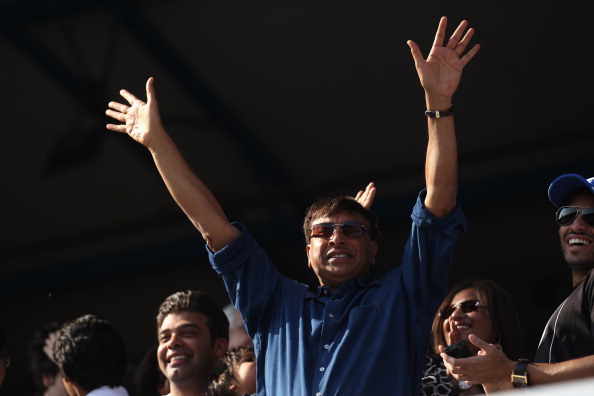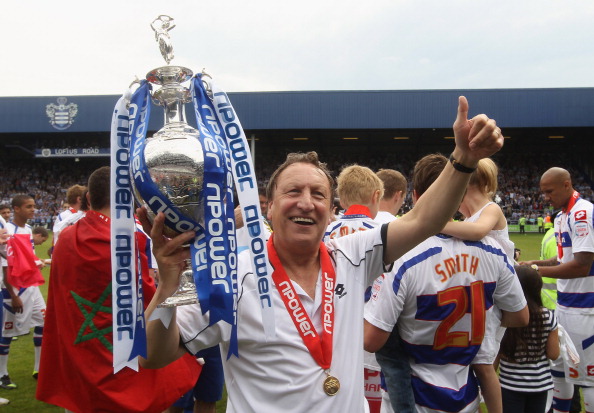Queen’s Park Rangers return to the Premiership will make their fans want to know is whether their rich owner will follow in the footsteps of Roman Abramovich. He is after all richer than Abramovich, indeed he is the richest man in Britain with a net worth of £24 billion ($39 billion).
But that’s not how Lakshmi Mittal sees things. QPR will not be a passion for him as Chelsea is for the Russian and, ironic at it may seem, that should be of some comfort to the fans of the West London club.
QPR, as Mittal himself acknowledges, is a club with a “chequered past” and what a past. Located almost next door to the BBC, it has had the sort of drama that could well inspire one of the corporation’s script writers. Since the club fell out of the Premiership in 1996, it has not only been in and out of administration but has had to cope with very unwelcome off the field headlines.
These have included the killing of youth player Kiyan Prince, a match with the China Olympic team which led to mass violence on the pitch, and a John Wayne-style high noon drama in the boardroom where Gianni Paladini, the chairman, alleged that a gun had been held to his head before a home match against Sheffield United. This resulted in a court case in 2006 which saw seven men being acquitted of charges of conspiracy to blackmail, false imprisonment and handgun possession.
Unlike other foreign owners, the Mittal’s acquisition of QPR was not driven by their wanting to use the club for a particular purpose. In fact the family stake is still only around 30 per cent. The rest is owned by Bernie Ecclestone, who is rich enough but not quite in the Mittal league. Initially, it was Mittal’s son-in-law, Amit Bhatia, who got the family involved – with a touch of drama which chimes in very well with the QPR story.
Picture the scene. It is 2007. Bhatia is about to leave the Mittal’s Berkeley Square office – next to the Jack Barclay car show room – when he looks on the giant television screen in the reception. “I saw”, recalls Amit, “on Sky News that Flavio [Briatore] and Bernie [Ecclestone] had bought QPR. I shot a text message to Flavio: ‘Congratulations, I hope you have lots of success with the club.'”
The two men are well known to the Mittals – Bernie sold Lakshmi Mittal the home he occupies in Kensington. A few days after buying QPR, Briatore and Ecclestone met Lakshmi and his son-in-law at the house. It did not take long for the Mittals to become a partner in the club.
As a family, the Mittals had long looked at buying an English club. They had been approached by many Premiership teams. QPR was the only Championship side they looked at – Bhatia had memories of watching QPR as a teenager – and the London location was an advantage as the family wanted to support a local club. It is interesting that the Mittals had turned down owning Indian Premier League franchises, cricket’s hottest property, because they are not often in India.
As Lakshmi Mittal (pictured waving to the crowd at Loftus Road) put it to me, “At that time it was just a passive investment. We had a 20 per cent shareholding. It was really in the spirit of fun rather than taking an interest in running a football club that we made the investment.”
 But it was much less fun when, as a result of Briatore’s problems with Formula One, he had to resign.
But it was much less fun when, as a result of Briatore’s problems with Formula One, he had to resign.
“Amit came to me and said, ‘Flavio has stepped down and the club is in trouble.’ I felt we should get out. I did not like the family to be in that negative news which was being thrown around Flavio and his past. But Amit persuaded me that we can do things for the club. Let us try for a year and see how we make progress.”
The Mittals increased their stake after Briatore left but more importantly took a decisive role in the overall management of the club. “When Flavio stepped down”, says Lakshmi, “the club was kind of an orphan and Amit took this challenge up.”
His most significant move was hiring Neil Warnock, a manager driven by an intense desire to return to the Premiership, and a man the father-in-law has come to admire.
“He has brought stability to the club, motivated the team. He is a great guy, a team player who I can see has fire in his belly. I hope he continues to lead QPR after we win promotion.”
Interestingly, like Warnock, Mittal senior did not at the start of the season believe QPR would win promotion. When I interviewed Warnock at the end of August, QPR was top of the table and unbeaten yet Warnock was insistent that dreams of Premiership were unrealistic.
“We have exceeded expectations. We’ve had seven new players and, as any manager will tell you, it takes a couple of months to bed them in. We’re nowhere near a top of the league side. We are really only a sixth to tenth position team with the people we’ve got. By Christmas you’ll see who the top sides are and I’d be very surprised if we are top then.”
He expected Cardiff, Middlesbrough and Ipswich to be near the top. Partly this was typical managerial speak of dampening down expectations so that the manager can claim the credit for working the miracle. But it was also realism as the previous season Warnock (pictured) had avoided relegation. Teams looking at the abyss of League One do not suddenly acquire the ability to gaze up at the stars of the Premiership.
 Not only did Mittal share his manager’s pessimism at the start of the season but, even at late as two months ago, he was not confident of the Premiership.
Not only did Mittal share his manager’s pessimism at the start of the season but, even at late as two months ago, he was not confident of the Premiership.
“Six or eight weeks ago, I don’t think even Neil was confident. He came to me at my Berkeley Square offices and he said, ‘We have this weakness and that weakness.’ I know managers speak more of weakness than strengths but it did not give me confidence. I became confident only when I went to see them and they won 2-1 [against Crystal Palace]. I told Amit, ‘We have improved, we are playing well, the team looks co-ordinated, the passing is good.’ That is when I began to believe we could do it.”
If this suggests a knowledge of the game, then it is derived from his youth in Kolkata. The Premiership is a world removed from that but it is where he loved playing football – he was a full back. “I was a big guy but I was doing an important job.”
Compared to his present wealth he did not have the money to watch the matches in the city, particularly the important ones involving the two big clubs, East Bengal and Mohun Bagan.
“I was 15 and I did not have the money to watch matches. At the back of the ground you could rent periscopes for 50 paise [half a pence] to peer into the ground. I had to save from my pocket money to hire the periscope.”
On coming to London, his first club was Chelsea. The Mittals had a box there which they gave up when they bought into QPR. Talking of Abramovich, Lakshmi says, “I know Roman because he is also in the steel business.” But he is quick to emphasise that his feel for football is different. “For Roman, Chelsea is his personal passion. I am a fan of QPR but I will not have that kind of passion which you see in Roman. I am passionate about my business.”
Mittal does say, “I can understand the passion of the fans.” But what gives him pleasure in owning QPR is that “a lot of people are interested in QPR, politicians know about it, people in the grass roots, even the doorman at Harry’s Bar knows about QPR. The club has a chequered history. This gives me a positive feeling when you go round and feel proud of it. I avoid saying I am involved in football because people may feel I am not focusing on my work. Unless someone asks I do not volunteer to tell them.”
But as a one who knows his football, Mittal concedes that, to do well in the Premiership, QPR needs new players. “There is still much we need to improve in the defence. To stay in the Premiership, we will need a good goal scorer.”
So will there be money for Warnock? This is the question fans want to know and Mittal’s answer is interesting.
“I think so because it is a big responsibility. You have to live up to the Premier League.” But then he adds, “But there are some clubs who like to have a big budget. There are other clubs who can do a good job with limited budgets but higher productivity.”
He continues, “We have been injecting money into the club as and when required.” [The club’s biggest purchase since 2007 has been Alejandra Faurlin for a mere £3.5 million ($5.7 million). This transfer led to questions about the player’s alleged third party ownership and an FA inquiry which finally decided that there should be no points deduction.]
Mittal’s words do not suggest Abramovich-style spending but then, for Lakshmi Mittal, “Football is not business, it is entertainment.”
While being in the Premiership, “is a very exciting moment” for the Mittal family, it will not change how they operate. “I shall not get more involved,” says Lakshmi, “I keep Amit in front. I am behind him all the time. Nobody recognises me at matches.”
Supporters seeking instant success want owners to be like them and broadcast their passion, as well as waving the cheque book. But an owner who, while fond of the club, can also take a detached view may, in the long term, provide the sort of stable growth that a club like QPR needs.
Mihir Bose is one of the world’s most astute observers on politics in sport and, particularly, football. He formerly wrote for The Sunday Times and The Daily Telegraph and until recently was the BBC’s head sports editor.

.jpg)